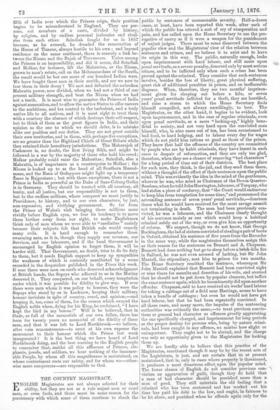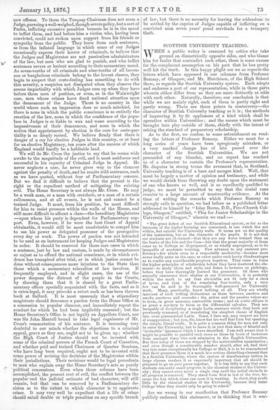The lower classes of English do not consider previous con-
viction an aggravation of guilt, though they do hold that THE COUNTRY MAGISTRACY. a man of bad character should be punished more than a new offence. To them the Torquay Chairman does not seem a Judge, pursuing a well-weighed, though severe policy, but a sort of Pasha, inflicting excessive penalties because he is in the mood to inflict them and had before him a victim who' having been convicted, could not reckon upon support from his friends or sympathy from the public. They learn from such sentences, as from the inflated language in which some of our Judges occasionally express their horror of criminals, to believe that the Judges and Magistrates are not passionless administrators of the law, but men who are glad to punish, and who inflict sentences severe or lenient according to their momentary mood. As seven-tenths of all criminals and nine-tenths of all larcen- ous or burglarious criminals belong to the lowest classes, they begin to suspect that caste-feeling has something to do with this severity, a suspicion not dissipated when they observe the serene impartiality with which Judges sum up when they have before them men of position, or even, as in the Wainwright case, men whose crimes have fixed national attention upon the demeanour of the Judge. There is no country in the world where such an impression does so much mischief, for there is none in which the public conscience is so entirely the creation of the law, none in which the confidence of the popu- lace in Judges is so liable to wax and wane according to the impassiveness of their demeanour, and none in which the notion that appointment by election is the cure for caste-par- tiality is so deeply rooted. We believe firmly that there is danger of a cry for elective Judges in this country, or at least for an elective Magistracy, ten years after the success of which England would hardly be a habitable land.
We will do Mr. Cross the justice to say that he seems wide awake to the magnitude of the evil, and is most assiduous and successful in his capacity of Criminal Judge in Appeal. He never neglects a case, he never gives way to the clamour against the penalty of death, and he remits wild sentences, such as we have quoted, without fear of Parliamentary censure. But we find it difficult to believe that the present is the right or the expedient method of mitigating the existing evil. The Home Secretary is not always Mr. Cross. He may be a weak man, or a man with crotchets, or a man of a certain callousness, and at all events, he is not and cannot be a trained Judge. It must, from his position, be most difficult for him to resist pressure within the walls of the House, and still more difficult to affront a class—the hereditary Magistrates —upon whom his party is dependent for Parliamentary sup- port. Even, however, if he were the best Court of Appeal obtainable' it would still be most unadvisable to compel him to use his power as delegated possessor of the prerogative every day or week. The power of pardon was not intended to be used as an instrument for keeping Judges and Magistrates in order. It should be reserved for those rare cases in which a sentence, just by law and custom, is made by circumstances so unjust as to offend the national conscience, or in which evi- dence has transpired after trial, or in which justice cannot be done without consequences more injurious to the State than those which a momentary relaxation of law involves. If frequently employed, and in slight cases the use of the power deepens the distrust of the people in the Courts, by showing them that it is shared by a great Parlia- mentary officer specially acquainted with the facts, and as it is extra-legal, it may provoke a retort such as has been thrown back at Salford. It is most unseemly that a stipendiary magistrate should denounce a pardon from the Home Office as a concession to popular clamour, and immediately repeat the conduct for which he had been implicitly censured ; but the Home Secretary's Office is not legally an Appellate Court, nor was Sir John Mantell bound to take legal cognisance of Mr. Cross's commutation of his sentence. It is becoming very doubtful to our minds whether the objections to a criminal appeal, grave as they are, ought not to be given up ; whether the High Court of Justice should not be invested with some of the criminal powers of the French Court of Cassation, and whether paid and trained Chairmen of Quarter Sessions, who have long been required, ought not to be invested with some power of revising the decisions of the Magistrates within their jurisdictions. Their revisions would be legal precedents to men who explain awqy the Home Secretary's acts as purely "political concessions. Even when those reforms have been accomplished, the present root of evil, the conflict between the popular and the judicial estimate of bad character, will still remain, but that can be removed by a Parliamentary de- cision as to the extent to which character is to aggravate crime. It may very well be expedient that a life of crime should entail double or triple penalties on any specific breath of law, but there is no necessity for leaving the addendum' to be settled.by the caprice of Judges capable of inflicting on 'a convicted man seven years' penal servitude for a trumpery theft.



































 Previous page
Previous page